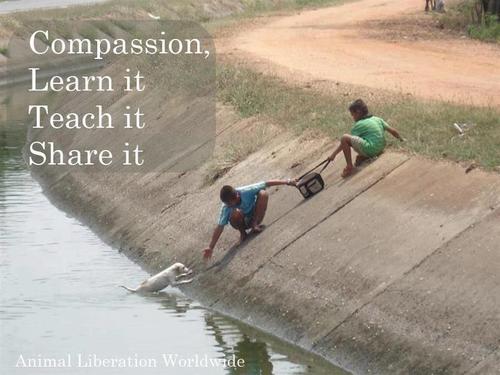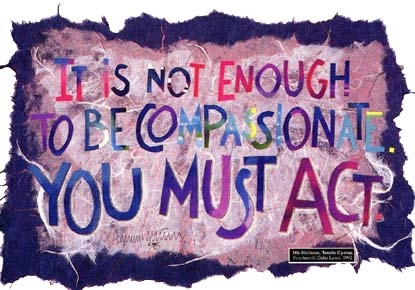'Do you believe compassion is simply in our nature or must it be nurtured to thrive?' -#1000Speak for Compassion
 |
The eternal debate of Nature Vs Nurture has given birth to an even more intriguing debate of whether we are born with compassion or our environment decides our compassion level. To start with-
What is compassion?
The widely understood definition: 'Compassion is the virtue of empathy for the suffering of others. It is regarded as a fundamental part of human love, and a cornerstone of greater social interconnection and humanism —foundational to the highest principles in philosophy, society, and personhood.'
 |
| Source: www.mindingthebedside.com |
In layman terms, compassion is the emotion that one feels in response to the suffering of others that motivates a desire to help. Compassion is the ability to regard someone else's suffering, and to feel the urge to relieve it. The etymology of "compassion" is Latin, meaning ''co-suffering''. It is synonymously used with kindness, empathy, pity or clemency. For example, if someone shows kindness, caring, and a willingness to help others, they're showing compassion.
Are we born with compassion?
I believe that we possess the capacity to be compassionate from birth but how compassionate one will be, depends upon their environment, i.e., the ability to be empathetic is natural, but what you do with it, whether and how you act on it, can change over a person's life. We have a natural desire to help others in distress. However, the capacity for empathy may differ depending upon the neural connections in the brain. Children who have disorders like autism or schizophrenia, the capacity for empathy may be partly or wholly lacking. It requires special care, attention and efforts by the parents to make their kids realise the importance of being compassionate.
For example, a toddler won't bother before taking the toy of another kid, no matter how loud the other kid cries. (s)He won't care until the same happens to him/her. He has to be taught to be compassionate.
Infants are the center of attraction as well as attention. To them, the world is all about them, anything they need, they do is being watched and taken care of. The self-awareness necessary for compassion doesn't exist in a newborn, it has to be developed. They learn to be compassionate from their parents.
 |
| Source: shutterstock.com |
Nurturing the Compassion
Although the natural instincts for kindness and compassion do exist in a human being, but the environment they live, their surroundings decide whether those instincts will be nurtured or suppressed.
Patient and good parenting plays a vital role in the child's future as a compassionate person. If a child grows up in a healthy environment, where everybody is loved and cared for, his emotional quotient would be higher and empathy level considerate. On the other hand, if he grows up in a violent environment, chances are that to him, violence won't be suffering. His empathetic level would be as low as none. The most important thing that a child needs to be taught is self-compassion. He should be taught to express himself and empathize with self.
 |
| Source: www.huffingtonpost.com |
Nancy Eisenberg, a psychologist, agreed. “Children need a positive, caring relationship with their parents or caretakers,” she said in an interview, “if they are to be able to go beyond themselves to care about others.”
Bad parenting or absence of empathy fosters antisocial behaviour, hence, sociopaths and psychopaths. Studies have found that children neglected by mothers, abandoned, mistreated or abused, often grow up to have no or very little regard for other human's sufferings unless nurtured.
A cruel fact is that the harshness of life or bad experiences can stunt the growth of empathy. A person who grows up to be compassionate can be driven towards a life with no empathy due to the effect of the environment he lives in. However, the positive point to be noted is that if the growth of empathy can be stunted, it can be nurtured too.
It is never late to instil empathy in a human. A random act of kindness can leave a deep and lasting effect on the mind and soul of a person that helps him to become empathetic. The world is need of compassion, a lot of compassion. It is the duty of all of us who are fortunate enough to have a compassionate soul to spread the kindness we have been endowed with, to make this world a much better place to live in for our coming generations.
What can YOU do about it?
 |
| Source: teresachinn.co.uk |
So, the next time:
- You see a homeless man sleeping uncovered on the pathway on a chilly winter morning, don't miss your chance of lessening his suffering by offering him a blanket.
- You see a wounded person, rush for help rather than thinking about the legal consequences of the cause of the wound.
- You see a hungry animal or an animal in distress, don't forget to toss some food and relieve it of the pain.
- You hear of a tragedy, don't hesitate in offering your support.
- Your child makes a mistake, tell them it's okay and they won't lose you because of it. Remember that a child should never be threatened with loss of love because there is no pain deeper than the loss of losing a loved one. Nurture compassion in them.
- Your supposedly selfish friend asks for help, leave all the pre-conceptions you have and show your compassion.
- You do something that makes you loathe yourself, offer self-compassion to your soul.
- You see an animal, be it social or literal, in need of help, give yourself a chance to make someone's life better. Be compassionate to them.
 |
| Source: obrag.org |
Spread love, joy and compassion because the world needs it, for hatred and pain need no escort; they know how to survive without it.
So, what do you think?
'Do you believe compassion is simply in our nature or must it be nurtured to thrive?'
Leave your views in the comment box!
Share the post and spread compassion around the world!
Let's spread the love in the village, the global village! :)
So, what do you think?
'Do you believe compassion is simply in our nature or must it be nurtured to thrive?'
Leave your views in the comment box!
Share the post and spread compassion around the world!
Let's spread the love in the village, the global village! :)
This post is part of #1000Speak for Compassion movement for 20th April, 2015. Last month over 1000 bloggers from all around the world spoke on Building from Bullying,#1000Speak, to make a difference, however small. They spoke to affect positive change and to instill hope. To get the message out that the world still cares. Is it surprising then that it was a great success? So #1000speak is back again this month to speak about compassion with the spotlight being on 'Nurturing'.
 |
In May, we will be talking about “Connection”. If you are interested in joining the #1000Speak movement, please follow the blog and join the Facebook group to connect with other participants and exchange ideas for the monthly topic. You do not need to be a blogger to participate! You can email your submission to 1000speak@gmail.com and it will be published on the blog on May 20th.